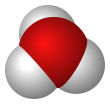ഹൈഡ്രിയോഡിക് ആസിഡ്
ഹൈഡ്രജൻ അയോഡൈഡിന്റെ ജലീയലായനിയാണ് ഹൈഡ്രിയോഡിക് ആസിഡ് (ഹൈഡ്രോഅയോഡിക് ആസിഡ് ). ജലീയ ലായനിയിൽ പൂർണ്ണമായും അയോണീകരിക്കപ്പെടുന്ന ഹൈഡ്രോഅയോഡിക് ആസിഡ് ഒരു ശക്തമായ ആസിഡാണ്. ഇത് നിറമില്ലാത്തതാണ്. സാന്ദ്രീകൃത ലായനിയിൽ സാധാരണയായി 48 - 57% ഹൈഡ്രജൻ അയോഡൈഡ് ആണുണ്ടാവുക. [2]
| |||
| |||
| Names | |||
|---|---|---|---|
| IUPAC name
Iodane[1]
| |||
| Other names
Hydronium iodide
| |||
| Identifiers | |||
3D model (JSmol)
|
|||
| ChEBI | |||
| ChemSpider | |||
| EC Number |
| ||
PubChem CID
|
|||
| RTECS number |
| ||
| UNII | |||
| InChI | |||
| SMILES | |||
| Properties | |||
| തന്മാത്രാ വാക്യം | |||
| Molar mass | 0 g mol−1 | ||
| Appearance | colorless liquid | ||
| Odor | acrid | ||
| സാന്ദ്രത | 1.70 g/mL, azeotrope (57% HI by weight) | ||
| ക്വഥനാങ്കം | |||
| Aqueous solution | |||
| അമ്ലത്വം (pKa) | -9.3 | ||
| Hazards | |||
| EU classification | {{{value}}} | ||
| R-phrases | R34 | ||
| S-phrases | (S1/2), S26, S45 | ||
| Flash point | {{{value}}} | ||
| Related compounds | |||
| Other anions | Hydrofluoric acid Hydrochloric acid Hydrobromic acid | ||
Except where otherwise noted, data are given for materials in their standard state (at 25 °C [77 °F], 100 kPa).
| |||
പ്രതികരണങ്ങൾ
തിരുത്തുകഹൈഡ്രിയോഡിക് ആസിഡ് വായുവിലെ ഓക്സിജനുമായി പ്രതിപ്രവർത്തിച്ച് അയോഡിൻ നൽകുന്നു:
- 4 HI + O2 → 2H
2O + 2I2
മറ്റ് ഹൈഡ്രജൻ ഹാലൈഡുകളെപ്പോലെ, ഹൈഡ്രോയോഡിക് ആസിഡും ആൽക്കീനുകളിൽ ചേർത്ത് ആൽക്കൈൽ അയഡിഡുകൾ നൽകുന്നു. ഇത് റെഡ്യൂസിംഗ് ഏജന്റായി ഉപയോഗിക്കാം, ഉദാഹരണത്തിന് ആരോമാറ്റിക് നൈട്രോ സംയുക്തങ്ങൾ അനിലൈനുകളിലേക്ക് മാറ്റുന്നതിന്. [3]
കാറ്റിവ പ്രക്രിയ
തിരുത്തുകഹൈഡ്രോയോഡിക് ആസിഡിന്റെ ഒരു പ്രധാന അന്തിമ ഉപയോഗമാണ് കാറ്റിവ പ്രക്രിയ , ഇത് മെത്തനോളിന്റെ കാർബണൈസേഷൻ വഴി അസറ്റിക് ആസിഡ് ഉൽപാദിപ്പിക്കുന്നതിനുള്ള ഒരു സഹ-ഉത്തേജകമായി വർത്തിക്കുന്നു. [4] [5]
നിയമവിരുദ്ധ ഉപയോഗങ്ങൾ
തിരുത്തുകഎഫെഡ്രിൻ അല്ലെങ്കിൽ സ്യൂഡോഎഫെഡ്രിൻ എന്നിവയിൽ നിന്ന് മെത്താംഫെറ്റാമൈൻ ഉൽപാദിപ്പിക്കുന്നതുമായി ബന്ധപ്പെട്ട ഒരു റെഡ്യൂസിംഗ് ഏജന്റായി ഇത് ഉപയോഗിക്കുന്നു. [6]
അവലംബം
തിരുത്തുക- ↑ Henri A. Favre; Warren H. Powell, eds. (2014). Nomenclature of Organic Chemistry: IUPAC Recommendations and Preferred Names 2013. Cambridge: The Royal Society of Chemistry. p. 131.
- ↑ Lyday, Phyllis A. (2005), "Iodine and Iodine Compounds", Ullmann's Encyclopedia of Industrial Chemistry, Weinheim: Wiley-VCH, pp. 382–390, doi:10.1002/14356007.a14_381
{{citation}}: Cite has empty unknown parameter:|authors=(help) - ↑ Kumar, J. S. Dileep; Ho, ManKit M.; Toyokuni, Tatsushi (2001). "Simple and chemoselective reduction of aromatic nitro compounds to aromatic amines: reduction with hydriodic acid revisited". Tetrahedron Letters. 42 (33): 5601–5603. doi:10.1016/s0040-4039(01)01083-8.
- ↑ Jones, J. H. (2000). "The Cativa Process for the Manufacture of Acetic Acid" (PDF). Platinum Metals Rev. 44 (3): 94–105. Archived from the original (PDF) on 2015-09-24. Retrieved 2021-05-01.
- ↑ Sunley, G. J.; Watson, D. J. (2000). "High productivity methanol carbonylation catalysis using iridium - The Cativa process for the manufacture of acetic acid". Catalysis Today. 58 (4): 293–307. doi:10.1016/S0920-5861(00)00263-7.
- ↑ Skinner, Harry F. "Methamphetamine Synthesis via HI/Red Phosphorus Reduction of Ephedrine".



